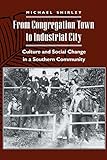From Congregation Town to Industrial City : Culture and Social Change in a Southern Community / Michael Shirley.
Material type: TextSeries: The American Social Experience ; 3Publisher: New York, NY : New York University Press, [2020]Copyright date: ©1994Description: 1 online resourceContent type:
TextSeries: The American Social Experience ; 3Publisher: New York, NY : New York University Press, [2020]Copyright date: ©1994Description: 1 online resourceContent type: - 9780814779774
- 9780814788882
- 975.6/67
- F264.W8 S48 1994
- online - DeGruyter
| Item type | Current library | Call number | URL | Status | Notes | Barcode | |
|---|---|---|---|---|---|---|---|
 eBook
eBook
|
Biblioteca "Angelicum" Pont. Univ. S.Tommaso d'Aquino Nuvola online | online - DeGruyter (Browse shelf(Opens below)) | Online access | Not for loan (Accesso limitato) | Accesso per gli utenti autorizzati / Access for authorized users | (dgr)9780814788882 |
restricted access online access with authorization star
http://purl.org/coar/access_right/c_16ec
In 1835, Winston and Salem was a well-ordered, bucolic, and attractive North Carolina town. A visitor could walk up Main Street from the village square and get a sense of the quiet Moravian community that had settled here. Yet, over the next half-century, this idyllic village was to experience dramatic changes. The Industrial Revolution calls forth images of great factories, mills, and machinery; yet, the character of the Industrial Revolution went beyond mere changes in modes of production. It meant the radical transformation of economic, social, and political institutions, and the emergence of a new mindset that brought about new ways of thinking and acting. Here is the illuminating story of Winston-Salem, a community of artisans and small farmers united, as members of a religious congregation, by a single vision of life. Transformed in just a few decades from an agricultural region into the home of the smokestacks and office towers of the R.J. Reynolds Tobacco Company and the Wachovia Bank and Trust Company, the Moravian community at Salem offers an illuminating illustration of the changes that swept Southern society in the nineteenth century and the concomitant development in these communities of a new ethos. Providing a rich wealth of information about the Winston-Salem community specifically, From Congregation Town to Industrial City also significantly broadens our understanding of how wholesale changes in the nineteenth century South redefined the meaning and experience of community. For, by the end of the century, community had gained an entirely new meaning, namely as a forum in which competing individuals pursued private opportunities and interests.
Mode of access: Internet via World Wide Web.
In English.
Description based on online resource; title from PDF title page (publisher's Web site, viewed 01. Nov 2023)


